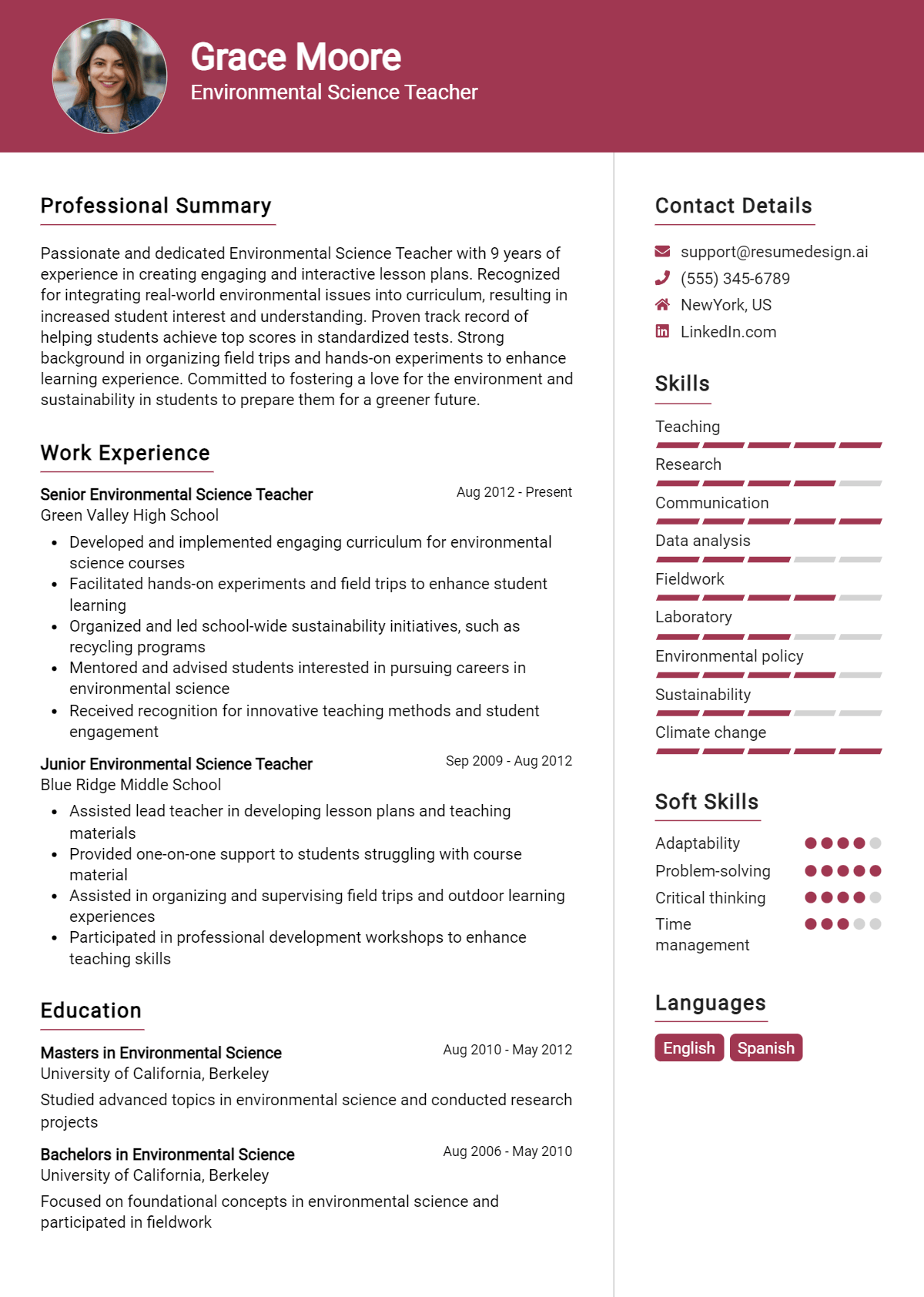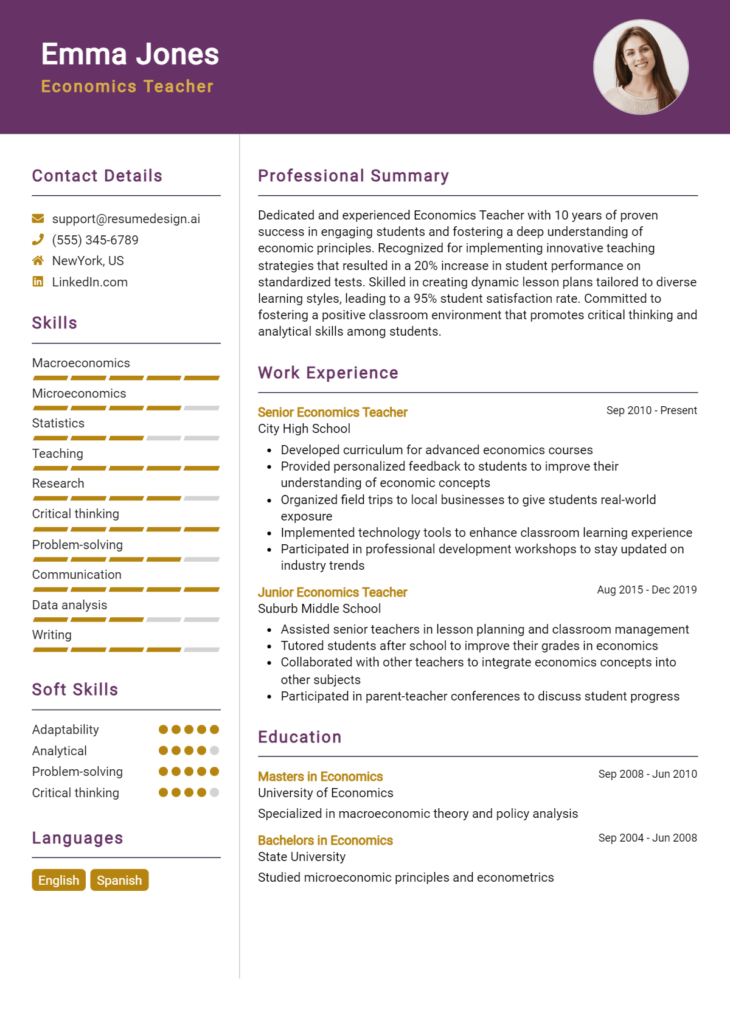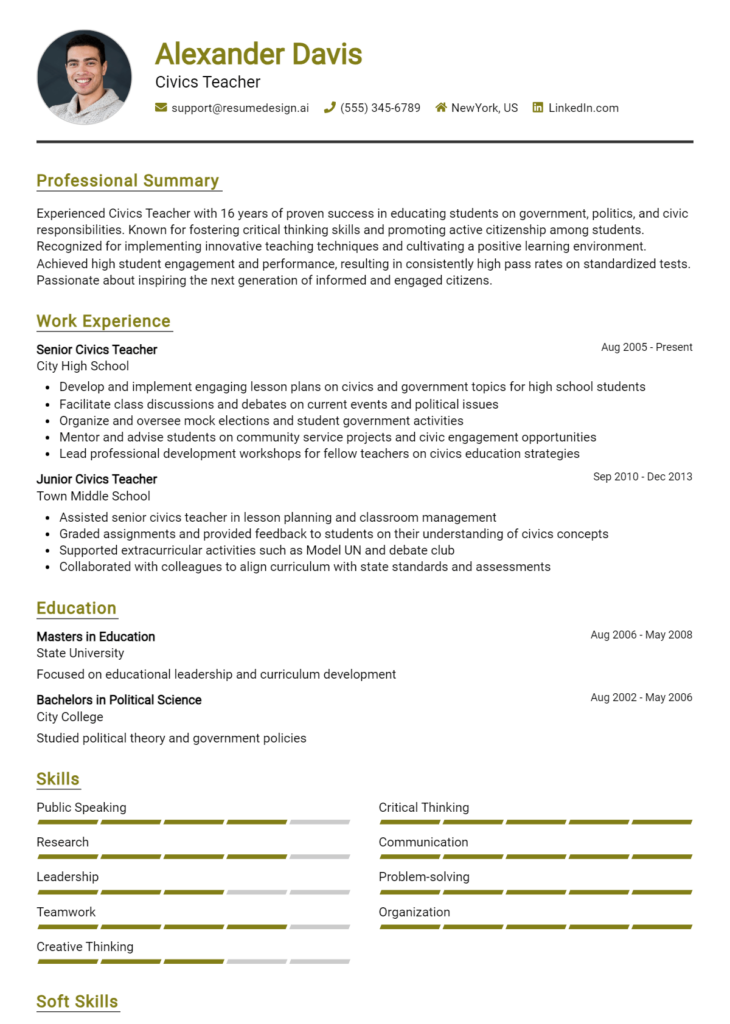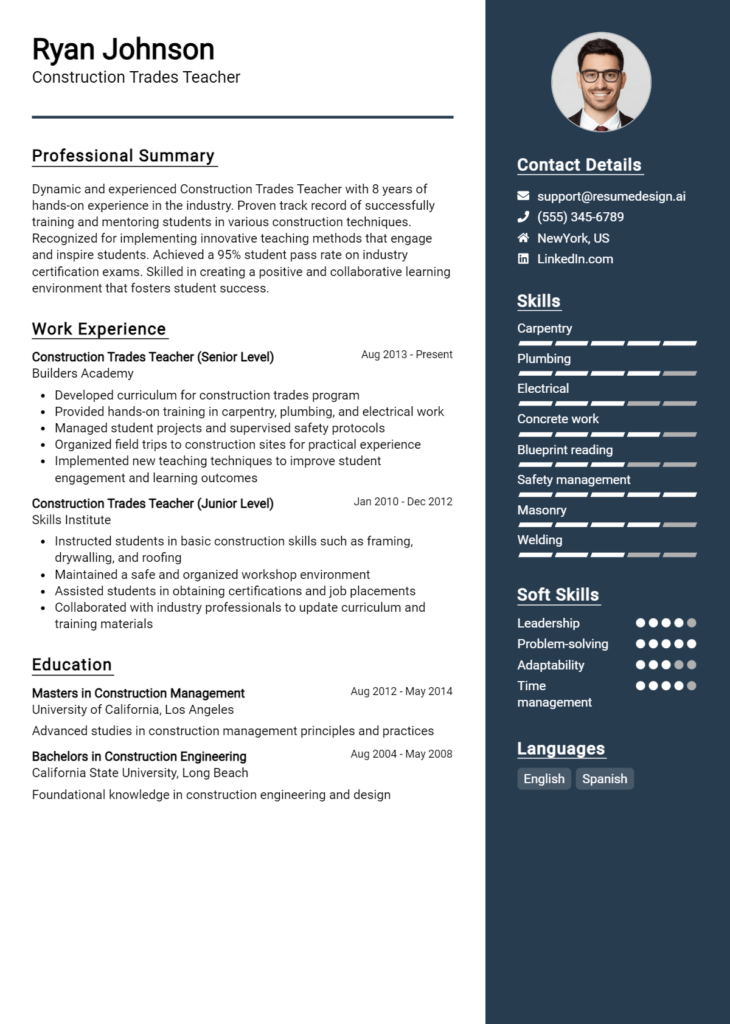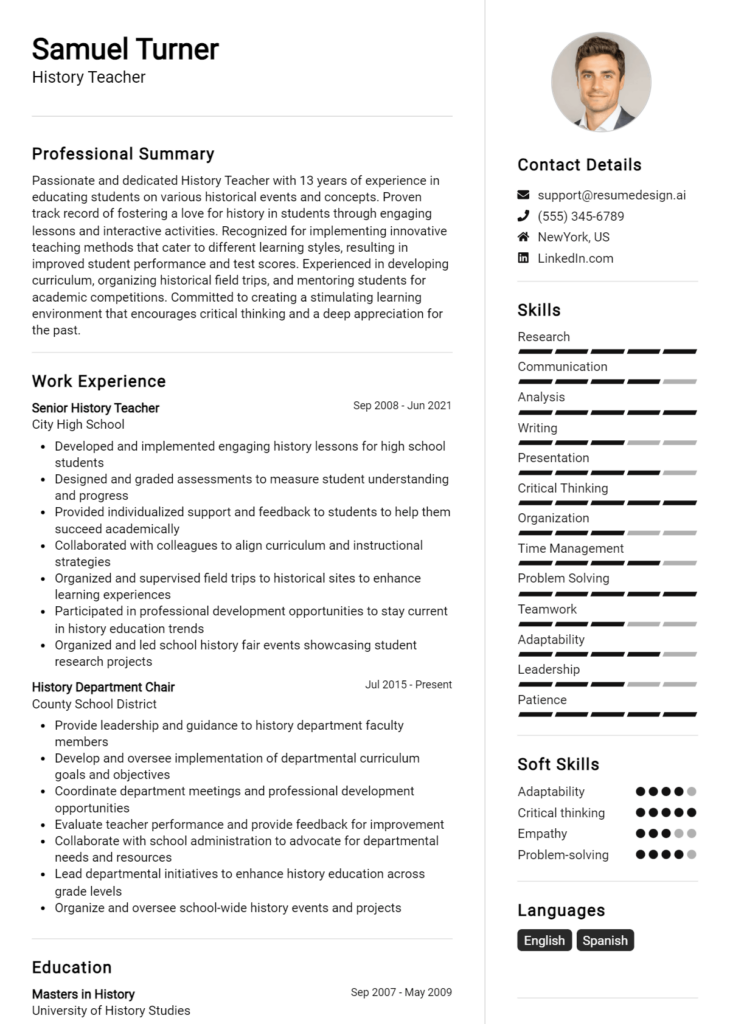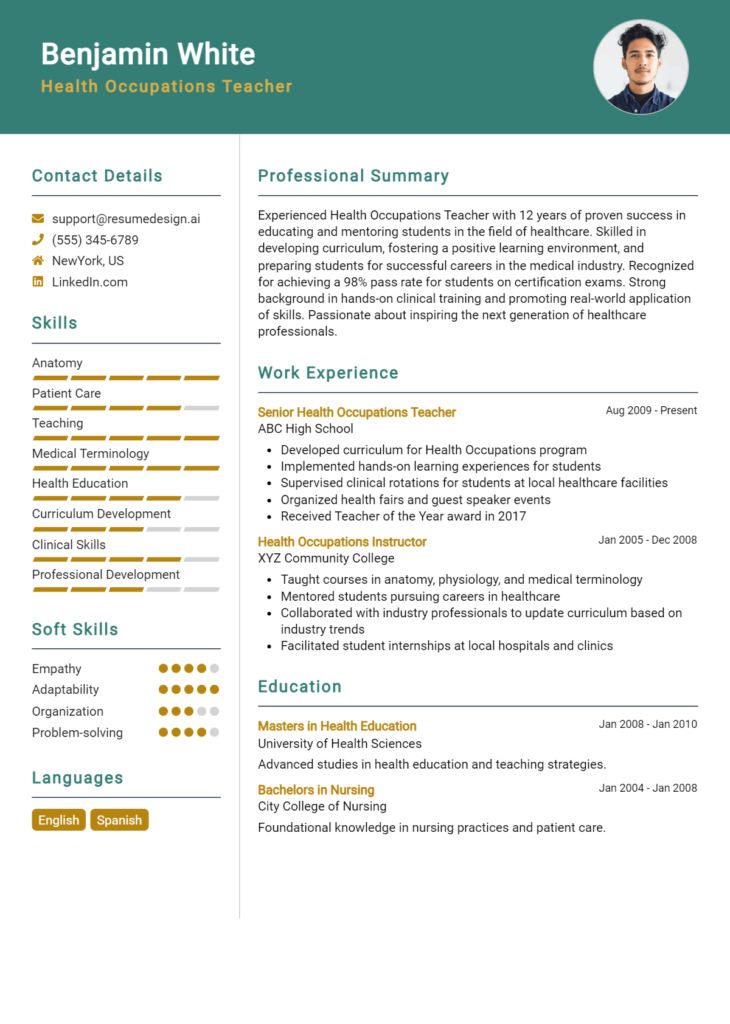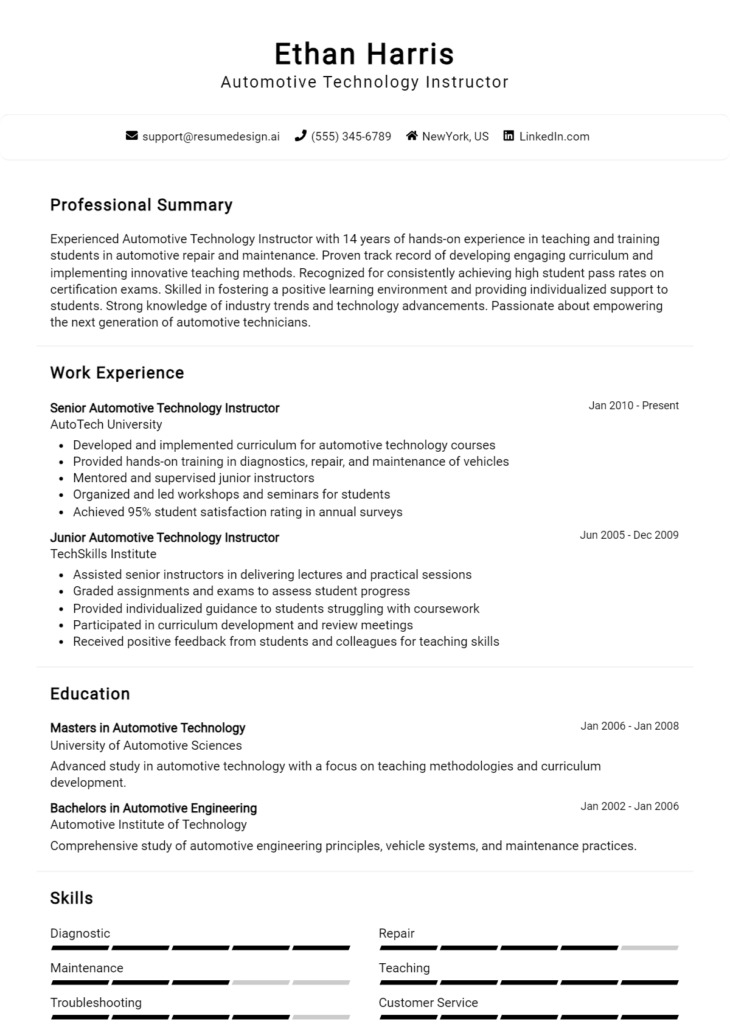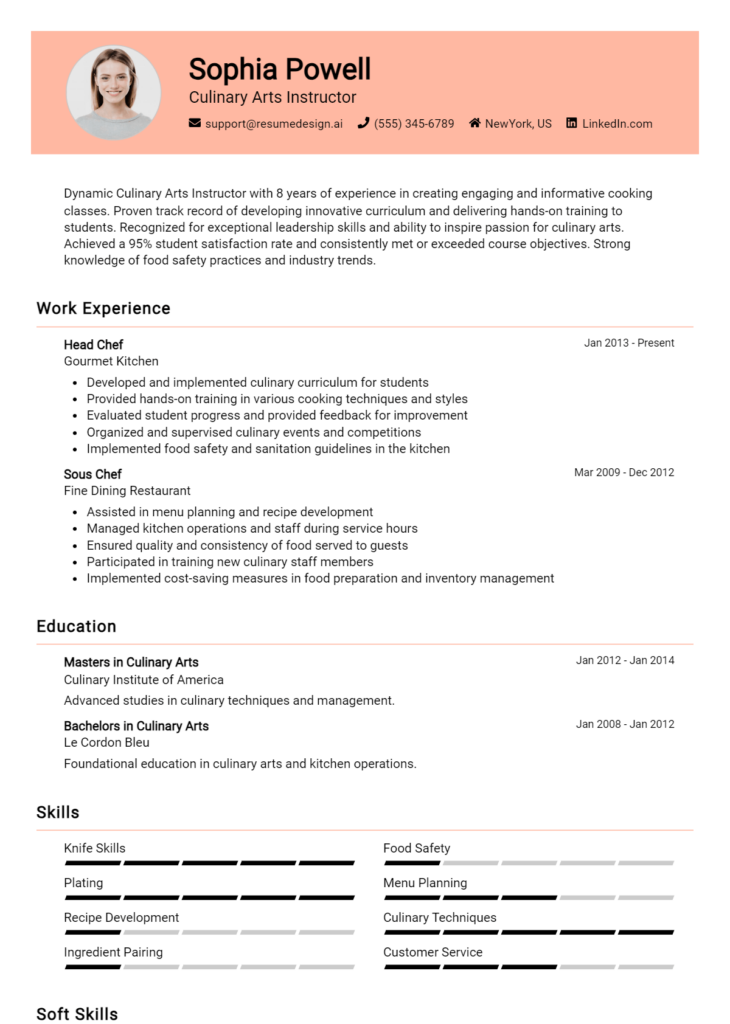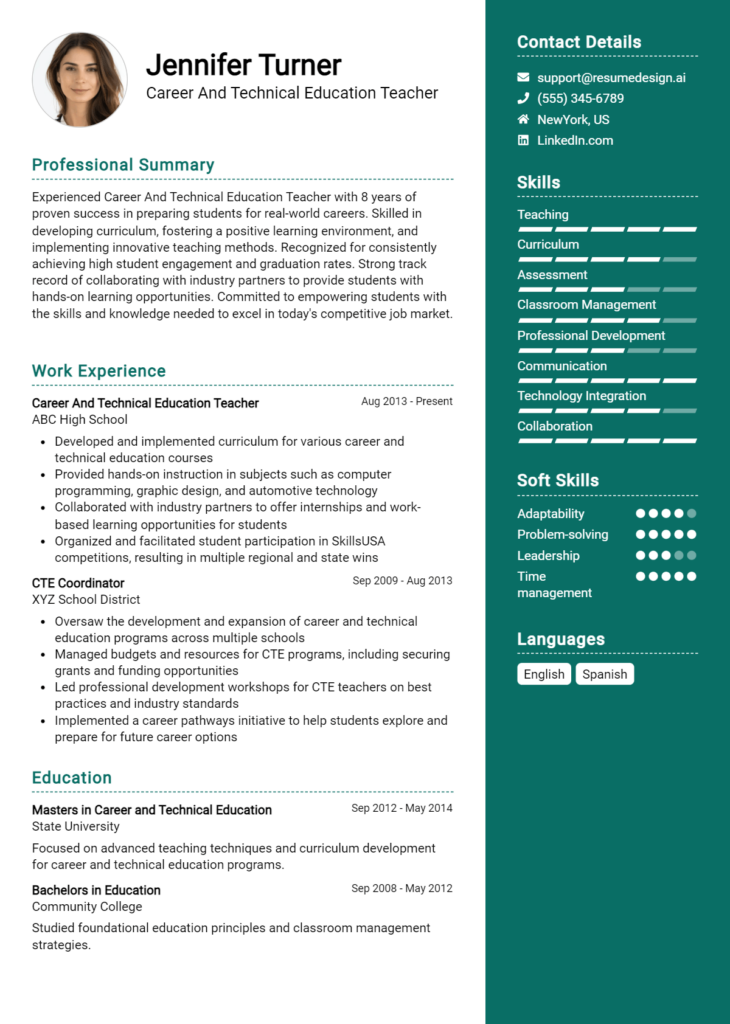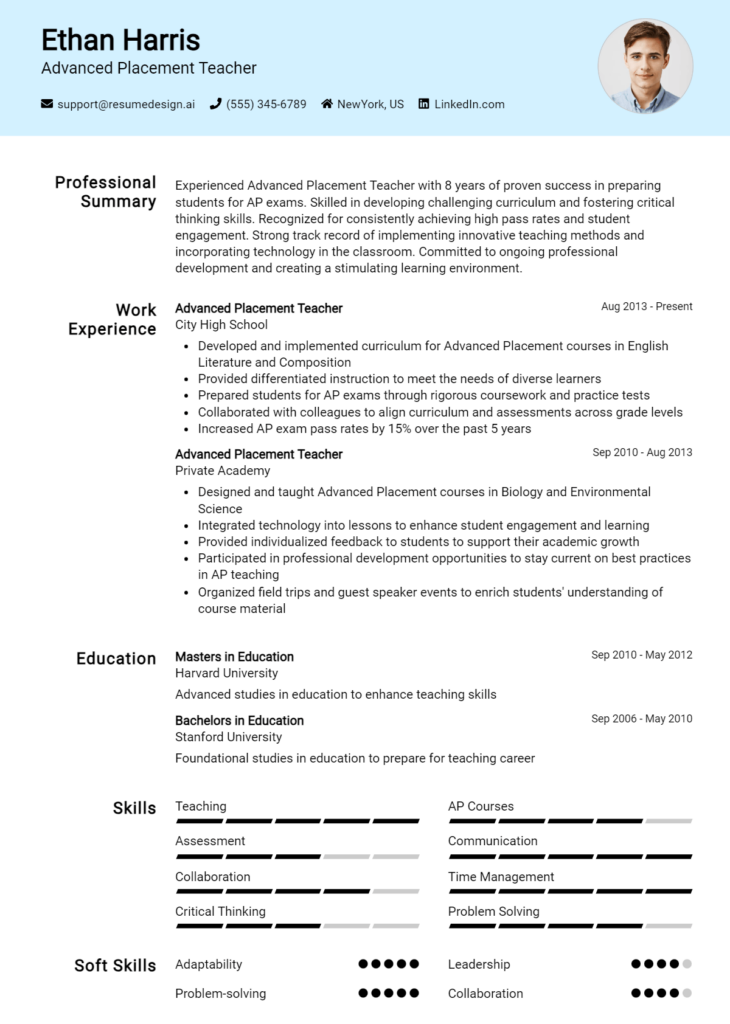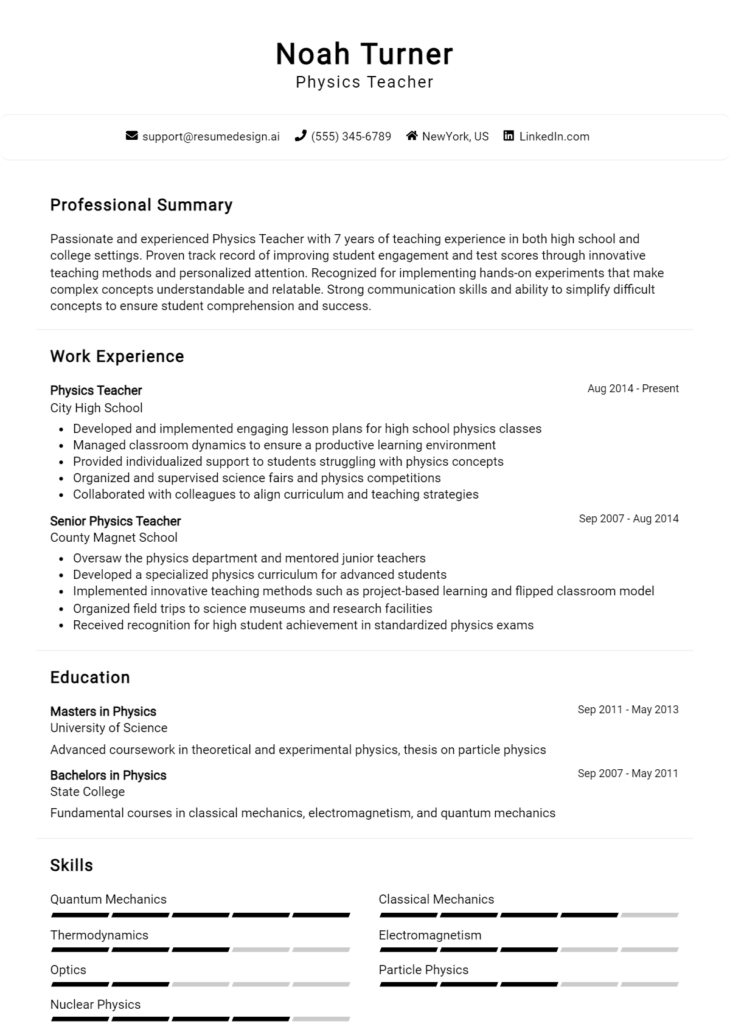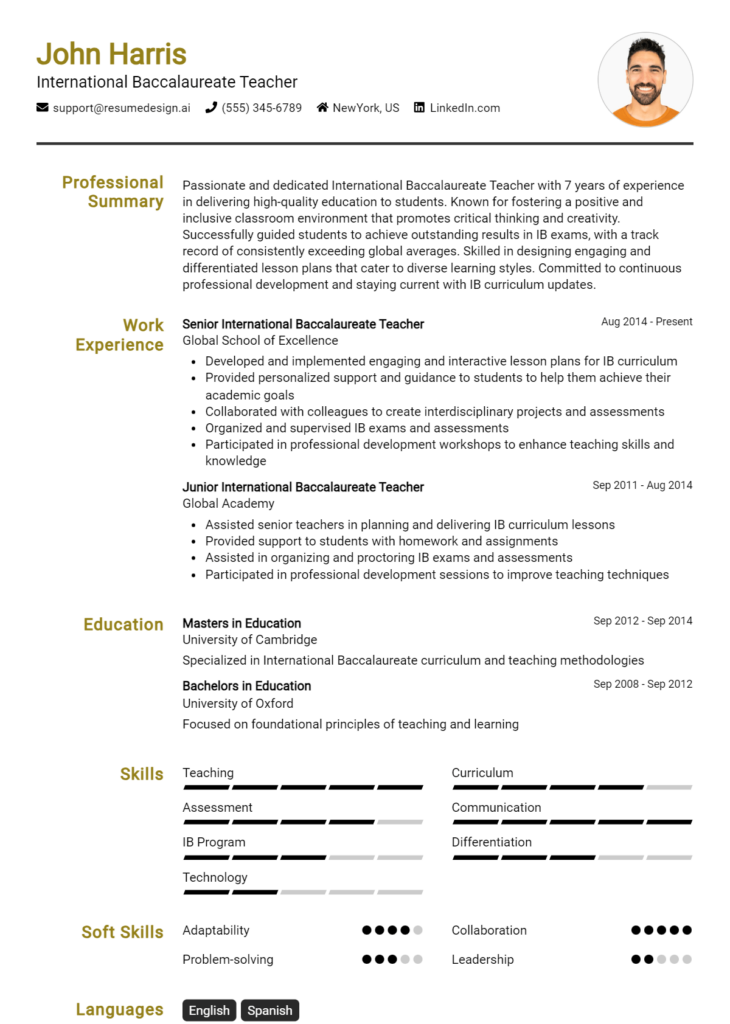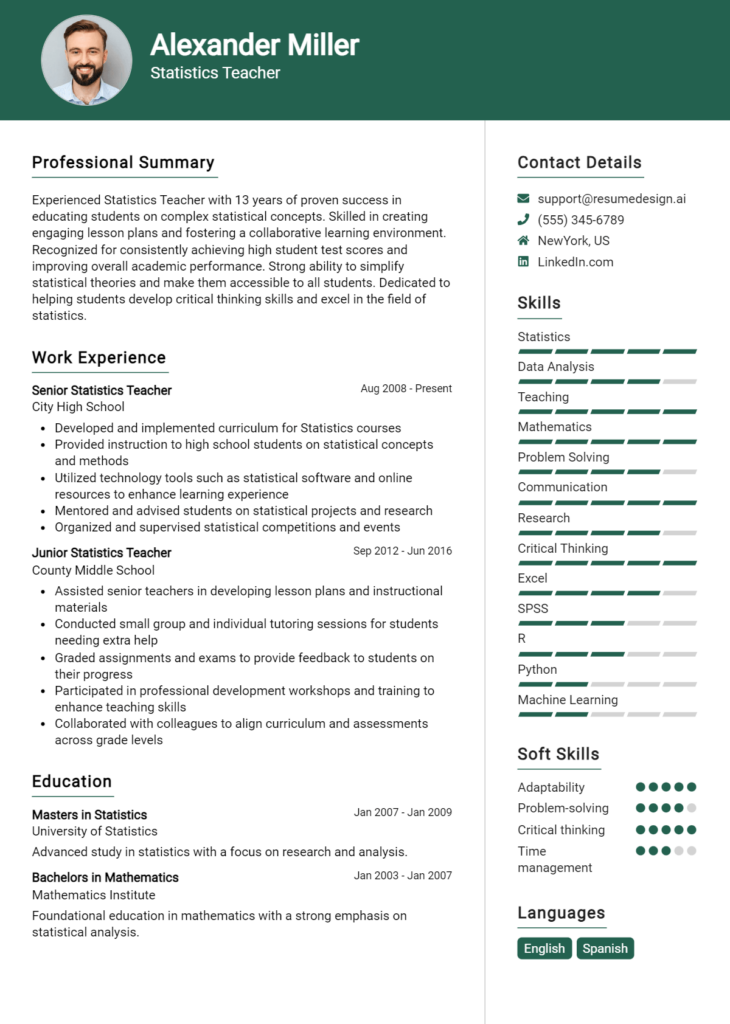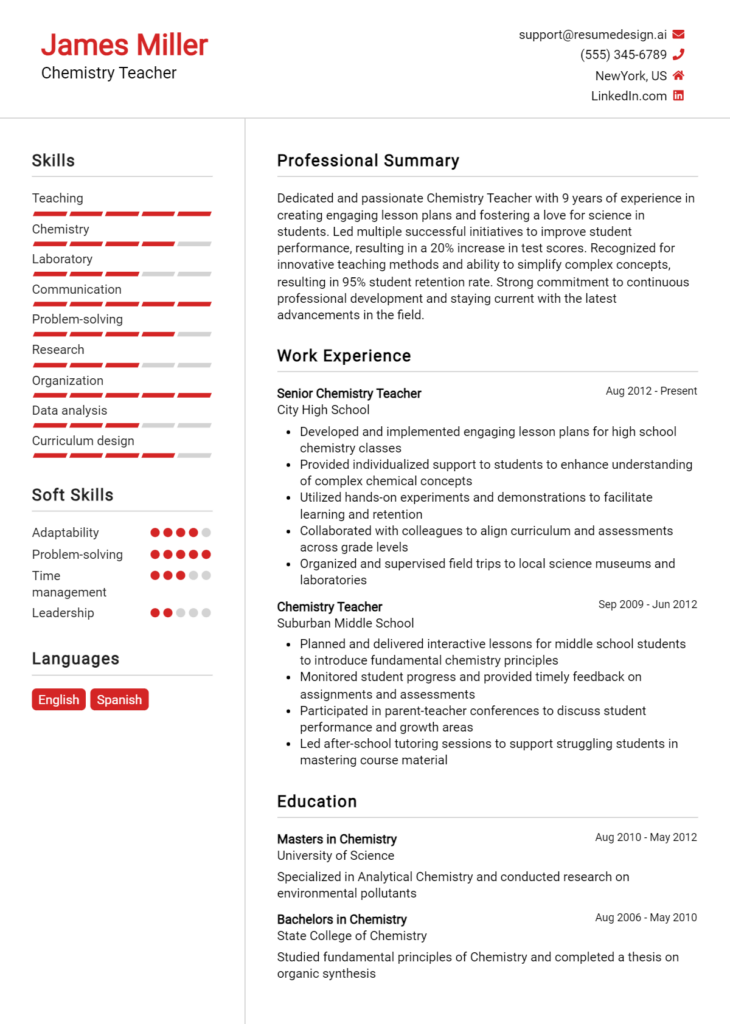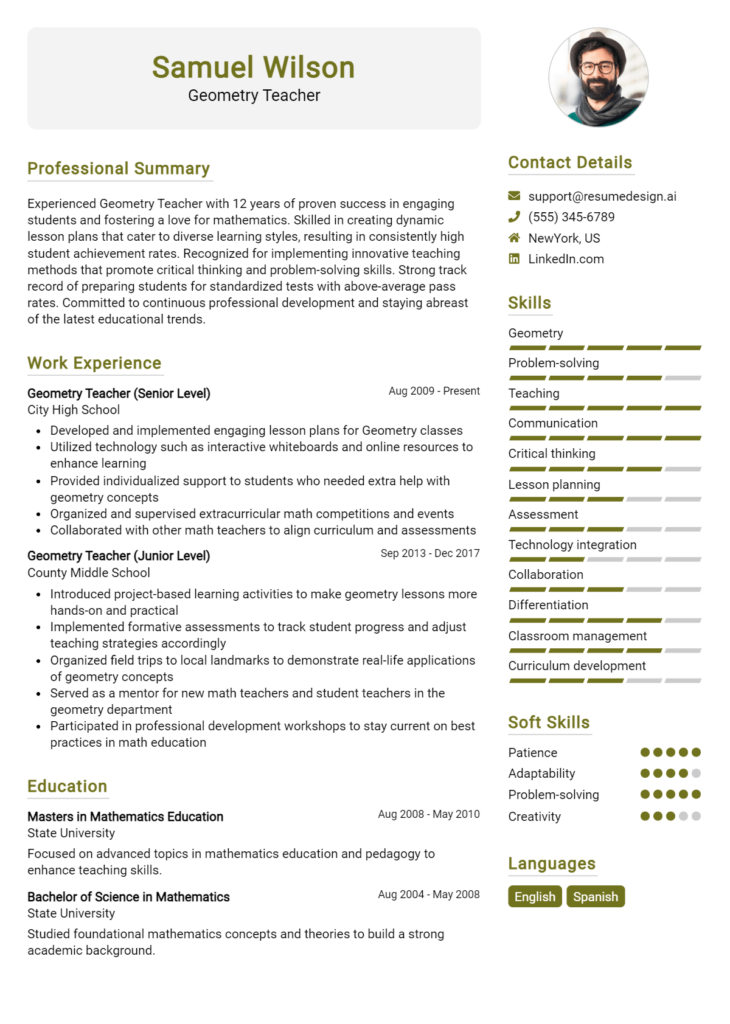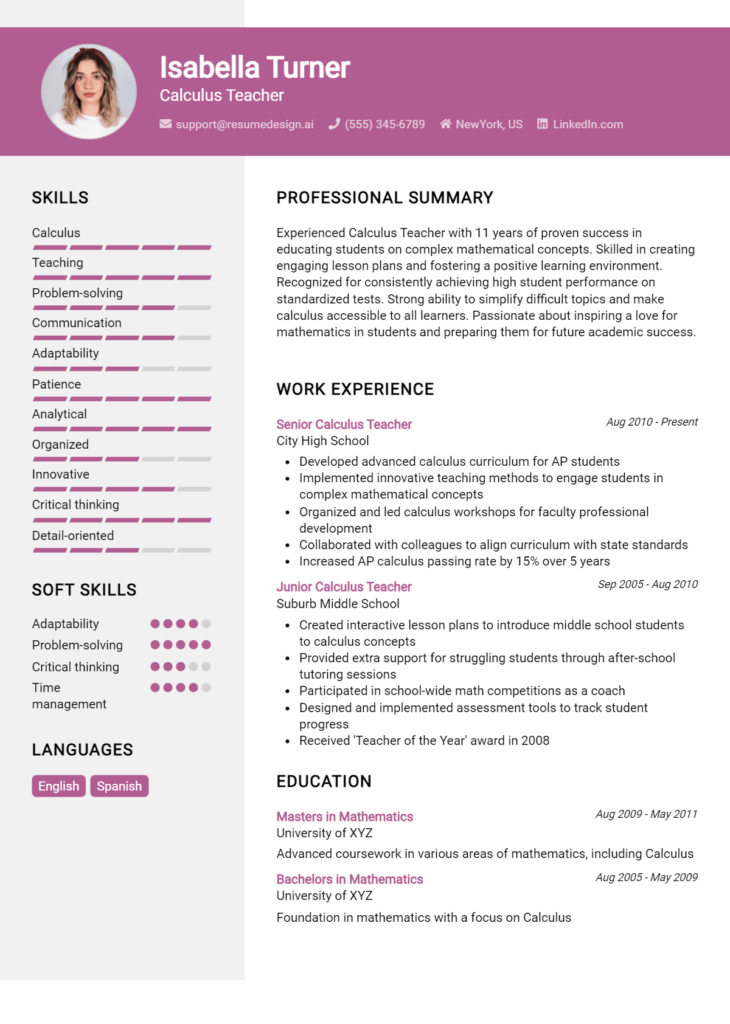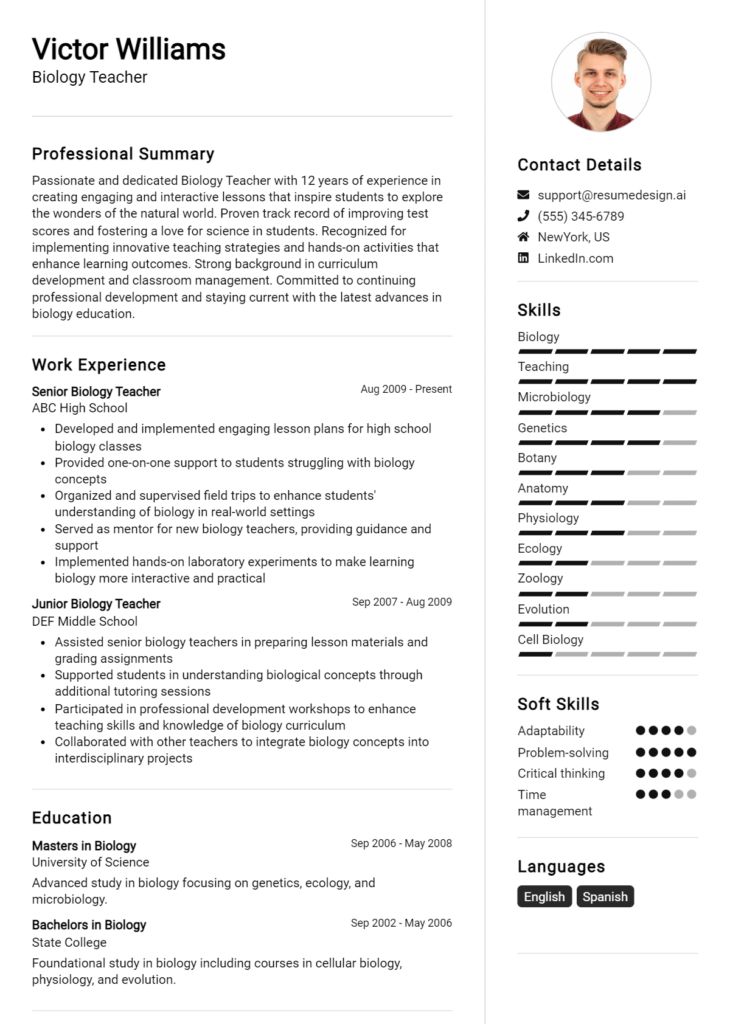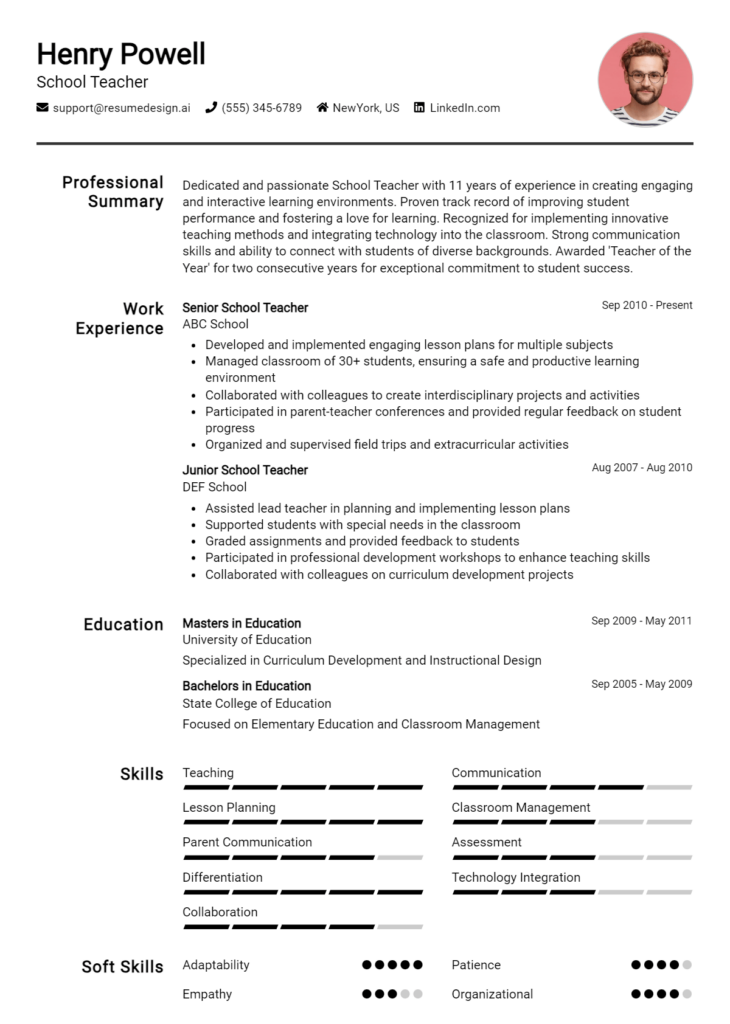Environmental Science Teacher Core Responsibilities
An Environmental Science Teacher plays a crucial role in educating students about ecological principles, sustainability, and environmental stewardship. Key responsibilities include developing curriculum, conducting engaging lessons, and assessing student understanding. This role requires strong technical skills in scientific methodologies, operational abilities to manage classroom environments, and problem-solving skills to address environmental issues. By effectively bridging science departments and promoting interdisciplinary learning, the teacher contributes to the organization's educational goals. A well-structured resume showcasing these qualifications can significantly enhance career prospects.
Common Responsibilities Listed on Environmental Science Teacher Resume
- Develop and implement comprehensive environmental science curriculum.
- Conduct hands-on laboratory experiments and field studies.
- Assess and evaluate student performance through tests and projects.
- Foster a collaborative and inclusive classroom environment.
- Integrate technology and multimedia resources into lessons.
- Organize and lead field trips to local ecosystems and conservation sites.
- Collaborate with other educators on interdisciplinary projects.
- Stay updated on current environmental issues and trends.
- Communicate with parents and guardians regarding student progress.
- Participate in professional development and community outreach programs.
- Encourage student participation in environmental clubs and initiatives.
High-Level Resume Tips for Environmental Science Teacher Professionals
In today's competitive job market, a well-crafted resume is essential for Environmental Science Teacher professionals looking to stand out among a sea of candidates. Your resume serves as the first impression you make on potential employers, and it's crucial that it effectively reflects your skills, achievements, and passion for environmental education. A strong resume not only highlights your qualifications but also conveys your commitment to fostering environmental awareness and sustainability in the classroom. This guide will provide practical and actionable resume tips specifically tailored for Environmental Science Teacher professionals, helping you create a compelling document that captures the attention of hiring committees.
Top Resume Tips for Environmental Science Teacher Professionals
- Tailor your resume to the specific job description by using keywords from the posting to demonstrate your alignment with the role.
- Highlight relevant teaching experience, including specific subjects taught, grade levels, and any special projects related to environmental science.
- Quantify your achievements, such as the number of students impacted, projects completed, or improvements in student engagement and test scores.
- Showcase industry-specific skills, such as knowledge of environmental regulations, sustainability practices, and proficiency in using technology for teaching.
- Include any certifications or degrees in environmental science, education, or related fields to establish your expertise.
- Demonstrate your commitment to professional development by listing workshops, conferences, or training sessions you have attended.
- Incorporate volunteer work or extracurricular activities that reflect your passion for environmental issues and education.
- Utilize a clean and professional format to ensure your resume is easy to read and visually appealing.
- Proofread thoroughly to eliminate any spelling or grammatical errors that could undermine your professionalism.
By implementing these tips, you can significantly increase your chances of landing a job in the Environmental Science Teacher field. A polished and targeted resume will not only showcase your qualifications but also demonstrate your dedication to fostering a better understanding of environmental issues among students. With the right approach, you can make a lasting impression that sets you apart from other candidates and opens doors to exciting teaching opportunities.
Why Resume Headlines & Titles are Important for Environmental Science Teacher
In the competitive field of education, particularly for specialized roles such as an Environmental Science Teacher, having a well-crafted resume headline or title is crucial. A strong headline serves as a powerful first impression, instantly capturing the attention of hiring managers and succinctly summarizing a candidate's key qualifications in a single, impactful phrase. This element should be concise, relevant, and directly aligned with the job being applied for, ensuring that it resonates with the specific requirements and expectations of the educational institution.
Best Practices for Crafting Resume Headlines for Environmental Science Teacher
- Be concise: Aim for a headline that is no longer than 10-12 words.
- Use role-specific keywords: Incorporate terms directly related to environmental science and education.
- Highlight key skills or qualifications: Focus on what sets you apart, such as certifications or teaching experience.
- Be impactful: Choose action words or strong adjectives that convey enthusiasm and expertise.
- Tailor to the job description: Customize your headline to reflect the specific role and institution you are applying to.
- Avoid jargon: Use clear language that can be easily understood by all hiring managers.
- Showcase achievements: If possible, hint at notable accomplishments or contributions in your field.
- Reflect your teaching philosophy: Consider including elements that reveal your approach to environmental education.
Example Resume Headlines for Environmental Science Teacher
Strong Resume Headlines
Passionate Environmental Science Teacher with 10 Years of Experience in Innovative Curriculum Development
Dedicated Educator Specializing in Hands-On Environmental Science Learning and Community Engagement
Award-Winning Environmental Science Teacher Focused on Student-Centered Learning and Sustainability Initiatives
Dynamic Environmental Science Educator with Proven Success in Enhancing Student Engagement and Performance
Weak Resume Headlines
Teacher Looking for a Job
Environmental Science Professional
Experienced Educator
The strong headlines are effective because they are tailored, specific, and convey a clear message about the candidate's unique qualifications and teaching philosophy. These headlines immediately communicate relevant experience and a passion for the field, making a strong impression on hiring managers. In contrast, the weak headlines fail to impress due to their vagueness and lack of specificity; they do not clearly articulate the candidate's strengths or the value they can bring to the educational institution, making them easily forgettable in a crowded applicant pool.
Writing an Exceptional Environmental Science Teacher Resume Summary
A resume summary is a crucial component for an Environmental Science Teacher's application, serving as the first impression that can capture the attention of hiring managers. A well-crafted summary succinctly highlights key skills, relevant experiences, and significant accomplishments, creating a compelling snapshot of the candidate's qualifications. Given the competitive nature of teaching positions, a strong summary should be concise, impactful, and specifically tailored to align with the job description, ensuring that it resonates with the needs and values of the hiring institution.
Best Practices for Writing a Environmental Science Teacher Resume Summary
- Quantify Achievements: Use numbers and metrics to demonstrate your impact, such as increased student engagement or improved test scores.
- Focus on Relevant Skills: Highlight specific skills that are vital for the role, such as curriculum development, hands-on laboratory experience, or environmental advocacy.
- Tailor Your Summary: Customize your summary for each job application, ensuring it addresses the specific requirements and values of the institution.
- Be Concise: Aim for 3-5 sentences that convey your qualifications without overwhelming the reader with excessive details.
- Use Action Words: Start sentences with dynamic action verbs to convey a sense of initiative and enthusiasm.
- Highlight Certifications: Mention any relevant certifications, such as a state teaching license or specialized training in environmental education.
- Showcase Passion: Convey your enthusiasm for teaching and environmental science, as this can resonate well with hiring managers.
- Incorporate Keywords: Use industry-specific keywords and phrases that align with the job description to improve the chances of passing through applicant tracking systems.
Example Environmental Science Teacher Resume Summaries
Strong Resume Summaries
Dedicated Environmental Science Teacher with over 8 years of experience in fostering a passion for environmental stewardship among high school students. Achieved a 30% increase in student participation in science fairs and eco-clubs through innovative curriculum design and engaging hands-on activities.
Results-driven educator with a Master’s in Environmental Science and a proven track record of improving student test scores by an average of 20% over three years. Skilled in integrating technology into the classroom to enhance learning experiences and promote environmental awareness.
Passionate Environmental Science Teacher with expertise in project-based learning and a commitment to sustainability. Successfully implemented a school-wide recycling program that increased participation by 50%, cultivating a culture of environmental responsibility among students.
Weak Resume Summaries
Experienced teacher looking for a position in environmental science. I have a background in science and enjoy working with students.
I am a dedicated educator with some experience in teaching environmental science. I believe in the importance of education.
The examples above illustrate the difference between strong and weak resume summaries. The strong summaries effectively showcase specific achievements, quantifiable results, and relevant skills that directly relate to the role of an Environmental Science Teacher. Conversely, the weak summaries lack specificity, fail to highlight key accomplishments, and come across as generic, making them less compelling to hiring managers.
Work Experience Section for Environmental Science Teacher Resume
The work experience section of an Environmental Science Teacher resume is critical as it provides a comprehensive overview of the candidate's professional background and expertise in environmental education. This section not only showcases the candidate's technical skills, such as knowledge of environmental science concepts and teaching methodologies, but also demonstrates their ability to manage classrooms effectively and collaborate with colleagues. When candidates quantify their achievements and align their experiences with industry standards, they significantly enhance their attractiveness to potential employers, illustrating a proven track record of delivering high-quality educational outcomes.
Best Practices for Environmental Science Teacher Work Experience
- Highlight relevant teaching certifications and specialized training in environmental science.
- Quantify achievements with specific metrics, such as student improvement rates or project success percentages.
- Emphasize collaboration with fellow teachers, community organizations, or environmental groups.
- Showcase innovative teaching methods or curriculum development that engages students in environmental issues.
- Include leadership roles, such as leading extracurricular activities, clubs, or environmental initiatives.
- Demonstrate continuous professional development and commitment to staying updated on environmental topics.
Example Work Experiences for Environmental Science Teacher
Strong Experiences
- Developed and implemented an interdisciplinary environmental science curriculum that increased student engagement by 30%, leading to a 20% improvement in test scores over two academic years.
- Organized a community-wide recycling program that reduced waste by 40%, involving over 200 students and parents in hands-on learning experiences.
- Collaborated with local environmental organizations to create field study trips, resulting in a 50% increase in student participation in outdoor education activities.
Weak Experiences
- Taught environmental science classes with no specific achievements or outcomes mentioned.
- Participated in team meetings and discussions without detailing contributions or impact.
- Assisted with school projects related to the environment without specifying results or engagement levels.
The examples listed as strong are considered effective because they provide clear, quantifiable outcomes that demonstrate the educator's impact on student learning and community engagement. They highlight specific initiatives that led to measurable improvements and showcase collaboration with external organizations, enhancing the teacher's credibility. In contrast, the weak examples lack detail and specificity, making it difficult to assess the candidate's contributions or effectiveness in their role. Without quantifiable results or impactful involvement, these experiences do not convey the same level of expertise or commitment to environmental education.
Education and Certifications Section for Environmental Science Teacher Resume
The education and certifications section of an Environmental Science Teacher resume plays a crucial role in establishing the candidate's academic qualifications and commitment to the field. This section not only highlights the individual's formal education but also showcases industry-relevant certifications and ongoing professional development efforts. By providing detailed information about relevant coursework, specialized training, and recognized certifications, candidates can significantly enhance their credibility and demonstrate their alignment with the specific requirements of the job role. In an ever-evolving discipline like environmental science, showcasing a commitment to continuous learning is essential for attracting potential employers.
Best Practices for Environmental Science Teacher Education and Certifications
- List degrees in order of relevance, starting with the most recent.
- Include relevant coursework that directly applies to environmental science topics.
- Highlight any advanced degrees or specialized certifications that enhance your expertise.
- Utilize clear and concise language to describe certifications and training.
- Emphasize certifications from recognized organizations in environmental science.
- Keep the section updated with the latest qualifications and achievements.
- Consider including ongoing education, such as workshops or online courses, to show commitment to professional growth.
- Use bullet points for clarity and easy reading.
Example Education and Certifications for Environmental Science Teacher
Strong Examples
- Master of Science in Environmental Science, University of Green Earth, 2021
- Certified Environmental Educator (CEE), National Association for Environmental Education, 2022
- Completed coursework in Environmental Policy and Sustainable Practices, University of Green Earth
- Bachelor of Science in Biology with a Minor in Environmental Studies, Coastal State University, 2018
Weak Examples
- Associate Degree in General Studies, Anytown Community College, 2015
- Certification in Basic First Aid, American Red Cross, 2019
- High School Diploma, Anytown High School, 2010
- Coursework in Ancient History, Not Applicable to Environmental Science
The strong examples are considered effective because they directly pertain to environmental science and demonstrate a solid academic foundation, relevant certifications, and specialized knowledge that align with the responsibilities of an Environmental Science Teacher. In contrast, the weak examples lack relevance to the field, showcasing outdated or unrelated qualifications that do not contribute to the candidate's suitability for the role. Candidates should focus on presenting qualifications that enhance their expertise and reflect current industry standards.
Top Skills & Keywords for Environmental Science Teacher Resume
As an Environmental Science Teacher, possessing a well-rounded skill set is crucial for fostering an engaging and informative learning environment. These skills not only reflect your expertise in the subject matter but also showcase your ability to communicate complex concepts effectively and inspire students to appreciate the importance of environmental stewardship. A well-crafted resume that highlights both hard and soft skills can significantly enhance your chances of securing a position in this rewarding field. By understanding the necessary qualifications and showcasing them effectively, you can demonstrate your commitment to educating the next generation about pressing environmental issues.
Top Hard & Soft Skills for Environmental Science Teacher
Soft Skills
- Communication
- Empathy
- Adaptability
- Teamwork
- Problem-solving
- Creativity
- Patience
- Leadership
- Organization
- Critical thinking
Hard Skills
- Knowledge of environmental policies and regulations
- Proficiency in scientific research methods
- Data analysis and interpretation
- Familiarity with environmental education resources
- Curriculum development
- Experience with laboratory equipment and safety protocols
- Geographic Information Systems (GIS) skills
- Understanding of ecological principles
- Proficiency in using technology for teaching (e.g., online learning platforms)
- Ability to conduct field studies and experiments
By integrating these skills into your resume alongside your relevant work experience, you can create a compelling narrative that illustrates your qualifications and passion for environmental education.
Stand Out with a Winning Environmental Science Teacher Cover Letter
Dear [Hiring Manager's Name],
I am writing to express my enthusiasm for the Environmental Science Teacher position at [School Name], as advertised [where you found the job listing]. With a Master's degree in Environmental Science and over [number] years of experience in teaching, I am excited about the opportunity to inspire and educate students about the critical issues facing our planet today. My passion for environmental education, coupled with my ability to create engaging and interactive lesson plans, makes me a strong candidate for this role.
In my previous position at [Previous School Name], I developed a curriculum that emphasized hands-on learning and real-world application of environmental concepts. By integrating field trips, laboratory experiments, and community projects, I helped students connect classroom knowledge to their local environment. I also utilized technology to enhance learning, incorporating multimedia presentations and virtual simulations that made complex topics accessible and engaging for all learners. My dedication to fostering a collaborative and inclusive classroom environment encourages students to think critically and work together towards sustainable solutions.
Moreover, I am committed to promoting environmental stewardship beyond the classroom. I have successfully led school-wide initiatives, such as recycling programs and sustainability fairs, which not only educated students but also involved the community and inspired actionable change. I believe that instilling a sense of responsibility towards the environment in young minds is essential for cultivating future leaders who will advocate for our planet. I am confident that my skills in curriculum development, student engagement, and community involvement align perfectly with the goals of [School Name].
Thank you for considering my application. I am excited about the possibility of contributing to your esteemed institution and fostering a love for environmental science among students. I look forward to the opportunity to discuss how my experiences and vision align with the mission of [School Name]. Please feel free to contact me at [Your Phone Number] or [Your Email Address] to schedule a conversation.
Sincerely,
[Your Name]
Common Mistakes to Avoid in a Environmental Science Teacher Resume
When crafting a resume for an Environmental Science Teacher position, it's crucial to present your qualifications and experiences effectively. However, many candidates fall into common pitfalls that can undermine their chances of securing an interview. Understanding these mistakes can help you create a compelling resume that highlights your strengths and aligns with the expectations of educational institutions. Here are some common mistakes to avoid:
Using a Generic Template: Relying on a one-size-fits-all resume template can lead to a lack of personalization. Tailor your resume to reflect your unique qualifications and the specific environmental science position you are applying for.
Neglecting Relevant Experience: Failing to emphasize experiences related to environmental education, fieldwork, or conservation can weaken your application. Highlight any teaching roles, volunteer work, or projects that showcase your relevant skills.
Overloading with Jargon: While it's important to demonstrate your expertise, using excessive technical jargon can alienate hiring managers. Strive for clarity and ensure your resume is accessible to a broader audience, including those without a scientific background.
Ignoring Teaching Philosophy: Many hiring committees look for insight into your teaching philosophy or approach to environmental education. Including a brief statement or integrating this into your experience can set you apart from other candidates.
Listing Responsibilities Instead of Achievements: Simply listing job duties can make your resume blend in with others. Instead, focus on quantifiable achievements and how you positively impacted students or programs in previous roles.
Failing to Proofread: Spelling and grammatical errors can create a negative impression and suggest a lack of attention to detail. Always proofread your resume multiple times and consider having someone else review it as well.
Not Including Professional Development: Omitting relevant certifications, workshops, or ongoing education related to environmental science or pedagogy can make your resume less competitive. Be sure to include any professional development that demonstrates your commitment to the field.
Neglecting Keywords from the Job Description: Many schools use applicant tracking systems (ATS) to screen resumes. Failing to incorporate relevant keywords from the job description can result in your application being overlooked. Analyze the posting and include pertinent terms where appropriate.
Conclusion
As an Environmental Science Teacher, you play a crucial role in shaping the minds of future generations regarding their relationship with the environment. This article has highlighted the importance of effective teaching strategies, curriculum development, and fostering a passion for sustainability among students. It has also discussed the significance of staying updated with the latest environmental issues and teaching methodologies to ensure your students receive a well-rounded education.
In conclusion, it's essential to reflect on your qualifications and experiences as you prepare or update your resume for this impactful role. A strong resume can significantly enhance your chances of securing a position that allows you to inspire and educate others about environmental science.
We encourage you to take the next step in your career journey by reviewing your Environmental Science Teacher resume. Utilize available resources to streamline the process. Explore resume templates to find a layout that suits your style, use the resume builder for an easy and guided creation process, check out resume examples for inspiration, and don't forget to craft a compelling introduction with our cover letter templates. Take action today to ensure your resume stands out and reflects your dedication to environmental education!

